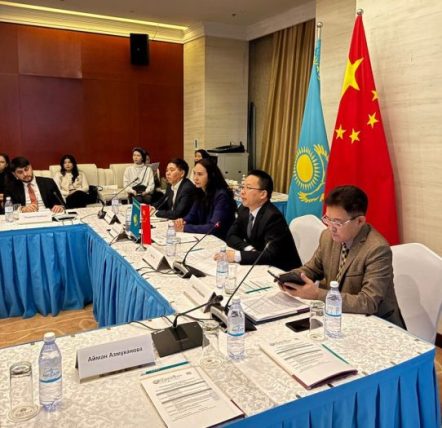THE COMMUNIST PARTY OF CHINA – STRIVING FOR THE PROGRESS OF HUMANITY AND THE GREAT UNITY OF THE WORLD

On October 22, 2024, in Astana, China Studies Centre successfully held a seminar on the topic: “The Communist Party of China — Striving for the Progress of Humanity and the Great Unity of the World.” The event gathered leading experts, scholars, and diplomats who discussed key aspects of the role of the Communist Party of China (CPC) in global processes.
The Director of the China Studies centre, Gulnar Shaimergenova, opened the seminar by emphasizing the important role of the CPC not only in China’s internal development but also in promoting international initiatives that contribute to global stability and prosperity. She noted that China, as a strategic partner of Kazakhstan, continues to demonstrate an example of responsible leadership and constructive cooperation in addressing world issues. According to Shaimergenova, the CPC’s commitment to creating a harmonious society and sustainable peace deserves special attention, especially in the context of the “Community of a Shared Future for Mankind” initiative.
Mr. Wang Tao, Counselor and Minister-Counselor of the Embassy of the People’s Republic of China in Kazakhstan, delivered a welcoming address. In his speech, Wang Tao emphasized that the CPC has fought throughout its history not only for the happiness of the Chinese people but also for the progress of humanity as a whole. He particularly highlighted China’s commitment to the five principles of peaceful coexistence, which form the foundation of the country’s international policy. Wang Tao also pointed out that China actively promotes the Global Development Initiative, the Global Security Initiative, and the Global Civilization Initiative, providing new answers to contemporary challenges.
Erkin Baidarov, PhD, Professor, and Chief Researcher at the R.B. Suleimenov Institute of Oriental Studies of the Science Committee of the Ministry of Education and Science of Kazakhstan, focused in his presentation on the philosophical foundations of the CPC, emphasizing the role of Chinese political thought in the country’s modernization. He detailed the evolution of ideas from Confucius to Deng Xiaoping and Xi Jinping, noting that the concept of “Great Unity” (Da Tong) is key to understanding China’s aspiration for a harmonious society. Baidarov also pointed out that the CPC plays a leading role in promoting the idea of a “Community of a Shared Future for Mankind” on the international stage.
Jamaladen Ibragimov, Professor at L.N. Gumilyov Eurasian National University, addressed the strategic achievements of the CPC, such as the new democratic revolution, reforms, and the establishment of a moderately prosperous society. He emphasized the significance of inter-party cooperation between China and other countries, including Kazakhstan, and discussed the role of the CPC in strengthening international ties, particularly through the “Belt and Road” initiative.
Eldaniz Huseynov, an expert in international relations, thoroughly covered China’s foreign policy, focusing on the role of the CPC in the Central Asian region. He noted that China promotes a multipolar world order and actively develops cooperation initiatives such as the Belt and Road Initiative (BRI). Huseynov emphasized that the CPC’s long-term strategies enable the country to effectively adapt to changes in the international situation and successfully strengthen its position on the world stage.
The seminar concluded with an engaging Q&A session, where participants discussed the prospects for further cooperation between Kazakhstan and China. It was noted that the CPC’s experience and China’s successes in modernization could serve as an example for other developing countries. Participants expressed confidence that such cooperation would contribute to the development and prosperity of both states.
China Studies Centre, Astana
